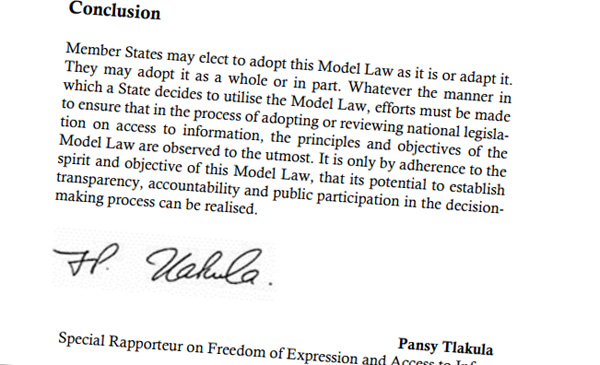The African Commission on Human and Peoples’ Rights (African Commission) adopted the ‘Model Law on Access to Information for Africa’ during its recently concluded Extra-Ordinary Session in Banjul, The Gambia. The adoption of the Model Law is a milestone for the African Commission, as it - for the first time - provides a practical tool to assist States in complying with the obligation under article 1 of the African Charter on Human and Peoples’ Rights to ‘adopt legislative, or other measures to give effect’ to the ‘rights, duties and freedoms enshrined’ therein.
This Model Law is an attempt by the African Commission to provide detailed and practical content to the legislative obligations of Member States to the African Charter with respect to the right of access to information, while leaving the specific form in which such the laws will be adopted to individual Member States. Ultimately, each Member State will have to decide on the nature and scope of adjustments to the content of this Model Law that is required, based on the provisions of its Constitution and the structure of its own legal system.
In recent years, several regional treaties have echoed the need for African Union Member States to prioritise the adoption of access to information legislation in the context of democracy, fighting corruption and ensuring service delivery. These include the African Charter on Democracy, Elections and Governance, the African Union Convention on Preventing and Combating Corruption and the African Charter on the Values and Principles of Public Service and Administration. Furthermore, several other continental treaties such as the African Youth Charter, the African Charter on Statistics and the Protocol to the African Charter on Human and People’s Rights on the Rights of Women in Africa also recognise the importance of access to information in the African context.
While some Member States have responded to the increased regional emphasis on access to information by enacting access to information legislation, most have failed to do so. The access to information legislative landscape in Africa is thus sparse, with only 10 (Angola, Ethiopia, Guinea, Liberia, Niger, Nigeria, South Africa, Tunisia, Uganda and Zimbabwe) of the 54 African Union Member States having adopted access to information legislation, each with varied degrees of compliance with regional and international standards. Numerous Member States also have access to information Bills, which are at various stages of the legislative process.
To address this, the African Commission during its 48th Ordinary Session held in November 2010, by Resolution 167 (XLVII), decided to begin a process of drafting model access to information legislation for Africa. In its decision, the African Commission mandated its Special Rapporteur on Freedom of Expression and Access to Information (Special Rapporteur) to lead this process.
The Draft Model Law is the product of a two-year long drafting process conducted under the auspices of the Special Rapporteur and coordinated by the Centre for Human Rights, University of Pretoria. Several expert meetings were held, the first of which resulted in the establishment of a ten-member Working Group comprising Access to Information (ATI) experts to develop the text of the draft Model Law. The initial draft of the Model Law was subsequently presented during the 49th Ordinary Session of the African Commission in April 2011.
To ensure further and more in depth consultation with stakeholders, between June 2011 and June 2012, four sub-regional consultations were held in Mozambique, Kenya, Senegal and Tunisia, to elicit feedback on the draft Model Law. Additionally, a public call for comments on the draft Model Law was made. The feedback received from these consultations, together with those received electronically, were considered and informed the finalisation of the Model Law by the Working Group.
The amended text was initially presented to the African Commission during its 52nd Ordinary Session in October 2012. At the presentation, useful comments were received from Commissioners, which formed the basis for the revised draft of the Model Law which was again presented to the African Commission at its recent session. After some further suggestions were made, the African Commission adopted the text in its final form.
The Model Law will be officially launched during the forthcoming Ordinary Session of the African Commission taking place from 9 to 23 April 2013.
May I use this opportunity to express my sincere thanks to all those who have contributed to the success of this endeavour, including funders such as the Open Society Foundations, especially the Open Society Initiative of Southern Africa and the Open Society Rights Initiative Fund; organisations that collaborated with me for the consultations; individuals or organisations who participated in consultations or provided comments on previous drafts of the Model Law; members of the Working Group and finally the Centre for Human Rights, which coordinated this process.
- Pansy Tlakula
Special Rapporteur on Freedom of Expression and Access to Information in Africa
Please note: The final version of the Model Law will be made available on the CHR website shortly


